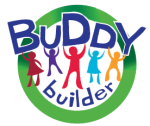Research
The Buddy Builder program was not only evaluated in a series of studies, but the goals and activities included in each lesson were grounded in research. The program was carefully and iteratively developed with extensive input from regional afterschool leaders and afterschool teachers, as well as elementary school children. The program was also evaluated in a small rigorously conducted study to test its effectiveness in improving social-emotional skills in 3rd to 5th-grade students.
Youth outcomes research
Goal:
To pilot and test the effectiveness of the Buddy Builder program for use in afterschool settings using a small randomized controlled trial design.
Main findings:*
Students in the Buddy Builder program were significantly improved in social-emotional skills than students who did not receive the program. Many social skills improved including:

Cooperativeness

Assertiveness

Self-control

Managing disagreements

Coping with victimization

Responding to peer’s social approaches

Give help to peer

Holding conversations with peers

Playing games
Program development research and activities
In collaboration with Eckerd Connects, Dr. Janis Kupersmidt and her research team developed the structure, goals, outline, and activities that compose the Buddy Builder program. Activities were originally written and instructions were scripted by a team of psychologists, afterschool teachers, and prevention professionals prior to Dr. Kupersmidt receiving a research grant from the National Institute on Drug Abuse (NIDA).

National web-based afterschool practices survey
Goal:
To obtain input from 411 regional leaders (Afterschool Ambassadors) in exemplary afterschool programs from across the nation on the practical considerations of curriculum adoption regarding afterschool prevention programs.
Main findings:
Regional afterschool leaders reported a widespread need for new prevention and SEL programming for elementary afterschool programs.
Physical activity is the top content-based program goal for afterschool programs; however, none of the existing SEL programs taught SEL skills in the context of physical activities.

Focus groups
Goal:
To gather feedback on proposed Buddy Builder lessons and activities from 15, 3rd to 5th grade students and 11 elementary afterschool teachers.
Main findings:
Elementary afterschool teachers found the activities to be appropriate for the afterschool setting, thought they would be easy to teach and manage, and that students would enjoy doing them.
Third- to fifth-grade students thought the activities were fun and interesting; the instructions were easy to understand; and taught them something new.
Objective observers reported high levels of engagement and use of targeted social-emotional skills.

Curriculum review
Goal:
To obtain feedback from 25 regional afterschool leaders (Afterschool Ambassadors) from across the nation working in exemplary afterschool programs on the activities and instructional materials in the Buddy Builder program.
Main findings:
Afterschool Ambassadors reported that the program content:
Promoted and supported positive social norms
Provided opportunities to connect learning SEL skills to school, home, and the community
Promoted supportive relationships
Was relevant
Targeted for students to learn and master specific social-emotional skills
Engaging
Provided appropriate structure
Provided meaningful opportunities for student involvement
Supported the physical and emotional safety of students
*Kupersmidt, J. B., Stump, K., & Stelter, R. L. (March 2019). Evaluation of the Buddy Builder Afterschool Program for Promoting Social-Emotional Skills in Elementary School-Aged Children. Poster presented at the biennial meeting of the Society for Research in Child Development, Baltimore, MD.
